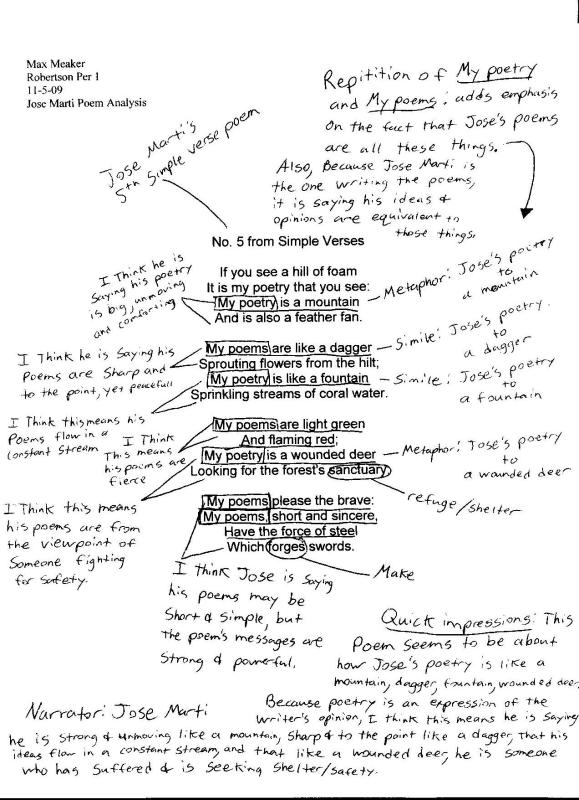Labels
American History
(37)
Book Review
(1)
Ceramics
(1)
Civics
(29)
Community
(1)
Computer
(1)
Creative Writing
(86)
Economics
(20)
English 11/12
(15)
English 9/10
(11)
English A
(24)
English B
(23)
English Make-Up Work
(4)
Health
(4)
Psychology/Sociology
(50)
Science
(1)
Seniors
(1)
World Studies
(25)
Friday, December 14, 2012
Counties Work
Last week you played a game to see how the federal budget is (or is not) balanced. Today, you will learn about the economic decisions made at the level of local government, at Counties Work on iCivics. Remember, you do NOT have to register (just click "No Thanks"). When you finish, you have the option to print a certificate; print the certificate to receive your daily grade.
Poetry Devices
Task 1: Define each of the following terms. Include an example for those terms with a star next to them. (3 points)
- Alliteration*:
- Allusion:
- Diction:
- Connotation vs. Denotation:
- Hyperbole*:
- Imagery*:
- Irony:
- Metaphor*:
- Motif:
- Onomatopoeia*:
- Personification*:
- Repetition:
- Rhyme*:
- Rhythm:
- Simile*:
- Symbol:
- Theme:
- Tone:
ALSO: What’s the difference between a narrative poem and a lyrical poem?
Task 2: Complete the poetry analysis worksheet to learn how poets use some of these devices. (3 points)
Task 3: Write your own poem (or poems) that uses at least one simile, one metaphor, and one personification. (4 points)
Thursday, December 13, 2012
People's Pie
Learn about the economics of the federal government, including expenditures and revenues at People's Pie on iCivics. When you finish, you have the option to print a certificate; print the certificate to receive your daily grade.
**Hint: take care of social security FIRST when you get to the expenditures section!
**Hint: take care of social security FIRST when you get to the expenditures section!
Gatsby Vocabulary
Fill in definitions for the following words under "MEANS" on your vocabulary packet:
Complacent: content, self-satisfied; happy with where you are and don't want changeReproach: to find fault or blame with someone
Gaudy: too showy, tasteless
Cordial: friendly, polite
Impetuous: doing something without really thinking about it, impulsive
Credibility: believability, backed up with evidence
Tantalizing: makes you want something
Tumultuous: disturbance, commotion, out of control situation
Insolent: boldly rude or disrespectful
Retribution: getting even or making some wrong right
Obstinate: stubborn
Cynical: distrustful
Thursday, December 6, 2012
Tuesday, December 4, 2012
1790-1850 Projects
Choose one of the terms to create a
Power Point or Poster presentation. You
will present this to the class. In
addition, you MUST provide students with a guided note-taking sheet OR a quiz
of the FIVE most important pieces of information that you cover.
Slide 1: Your term, a picture or graphic (with website
cited) & your name
Slide 2: Definition of the term/brief overview—Make
sure we “get” it!
Slide 3: Who are the important people associated with
this term?
Slide 4: What led up to this? How did this happen?
Slide 5: When did this happen?
Slide 6: Where did this happen/Where are the areas
affected by this?
Slide 7: How did/does this affect the future? (Think
long & short term)
Slide 8: Why are we studying this? Why is this important?
Slide 9: Additional pictures/graphics (with websites
cited)
Slide 10: Bibliography (At a MINIMU, copy and paste ALL
websites used for information or pictures)
**ANY information that has been
COPIED and PASTED MUST BE IN QUOTATION MARKS with the website address following
in parenthesis. Websites must ALSO be
listed in your bibliography!!!!!
Example: George Washington “learned
the morals, manners, and body of knowledge requisite for an 18th century
Virginia gentleman.” (http://www.whitehouse.gov/about/presidents/georgewashington)
You are the teacher!
Choose one of the terms to create a
Power Point or Poster presentation. You
will present this to the class. In
addition, you MUST provide students with a guided note-taking sheet OR a quiz
of the FIVE most important pieces of information that you cover.
Slide 1: Your term, a picture or graphic (with website
cited) & your name
Slide 2: Definition of the term/brief overview—Make
sure we “get” it!
Slide 3: Who are the important people associated with
this term?
Slide 4: What led up to this? How did this happen?
Slide 5: When did this happen?
Slide 6: How did/does this affect the future? (Think
long & short term)
Slide 7: Why are we studying this? Why is this important?
Slide 8: Additional pictures/graphics (with websites
cited)
Slide 9: Bibliography (At a MINIMUM, copy and paste ALL
websites used for information or pictures)
**ANY information that has been
COPIED and PASTED MUST BE IN QUOTATION MARKS with the website address following
in parenthesis. Websites must ALSO be
listed in your bibliography!!!!!
Example: George Washington “learned
the morals, manners, and body of knowledge requisite for an 18th century
Virginia gentleman.” (http://www.whitehouse.gov/about/presidents/georgewashington)
You will be graded on the day of
your presentation on the following:
Being
prepared, speaking loudly and clearly
The
accuracy (did you use reliable websites and include your bibliography?)
The completeness
of your presentation (did you cover it all?)
Each
of your “students” getting at least an 85% on your quiz or notes
Your attention to
your peers’ presentation
- War of 1812
- Louisiana Purchase/Exploration of Louis and Clark
- Monroe Doctrine
- Indian Removal Act & Trail of Tears
- Whiskey Rebellion & Shay’s Rebellion
- Annexation of Texas/Battle of the Alamo
- Manifest Destiny/Oregon Trail
- California Gold Rush
- Pony Express, Erie Canal, & the “iron horse”
- Seneca Falls Convention
- The Know-Nothing Party
Subscribe to:
Posts (Atom)

